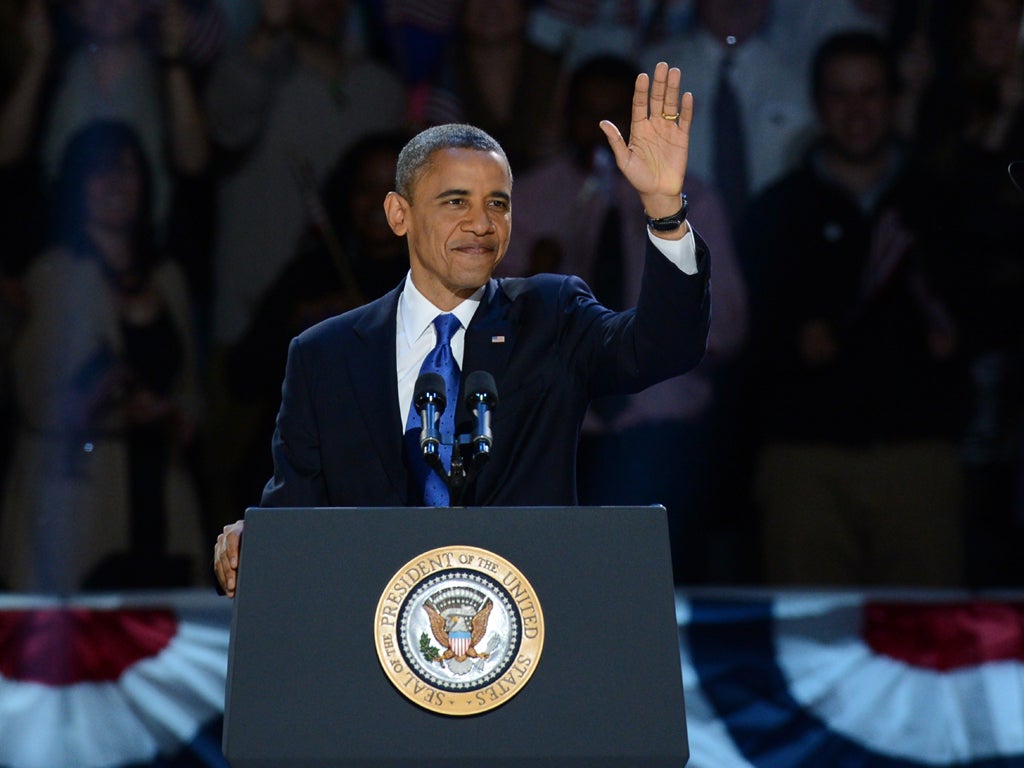Obama advisers see mandate for fiscal policy

Your support helps us to tell the story
From reproductive rights to climate change to Big Tech, The Independent is on the ground when the story is developing. Whether it's investigating the financials of Elon Musk's pro-Trump PAC or producing our latest documentary, 'The A Word', which shines a light on the American women fighting for reproductive rights, we know how important it is to parse out the facts from the messaging.
At such a critical moment in US history, we need reporters on the ground. Your donation allows us to keep sending journalists to speak to both sides of the story.
The Independent is trusted by Americans across the entire political spectrum. And unlike many other quality news outlets, we choose not to lock Americans out of our reporting and analysis with paywalls. We believe quality journalism should be available to everyone, paid for by those who can afford it.
Your support makes all the difference.President Barack Obama spent Thursday meeting with senior advisers and returning a series of congratulatory phone calls from foreign leaders as the glow of his successful campaign faded into the impending grind of governing in a divided Washington.
A day after congressional leaders set the tone for the difficult fiscal negotiations ahead, Obama remained out of sight, leaving his senior campaign staff to put a bow on his decisive electoral win this week as he considered the issues he will pursue in a second term.
An incumbent president customarily gives a news conference soon after reelection, and Obama has a limited number of days to do so before leaving late next week for a five-day trip to Thailand, Cambodia and Myanmar — the first visit by a U.S. president to that long-isolated nation, formerly known as Burma, which is undergoing a measure of democratic reform.
When Obama does reemerge, his initial post-election appearance before the media could indicate his mood and intentions heading into the next term. Two days after his reelection in 2004, President George W. Bush said in a White House news conference, "I earned capital in the campaign, political capital, and now I intend to spend it."
On Friday afternoon, Obama will deliver a statement in the East Room. A White House official said it would be about "the action we need to take to keep our economy growing and reduce our deficit." Those will be his first official remarks since his victory speech.
Obama so far has been conciliatory in his post-election remarks, and on Thursday he allowed his senior campaign advisers to speak for him.
In a conference call with reporters, senior adviser David Plouffe said the president's reelection amounted to a mandate from voters, who want to see Washington approach negotiations over the federal budget and its yawning deficit in a "balanced way."
The White House and Congress are facing a year-end deadline to avert a series of automatic tax increases and spending cuts, known collectively as the "fiscal cliff." Economists have warned that the combination could push the fragile economy back into recession.
Obama pledged during the campaign to allow the Bush-era tax rates paid by the richest Americans to expire, generating revenue that would help pay for infrastructure renewal, education and deficit reduction. But congressional Republicans have balked at raising any taxes, setting up a confrontation.
"One of the messages sent by the American people throughout the campaign was they clearly chose the president's view that the wealthiest Americans must do a little more in a balanced way," Plouffe said. "Voters don't see compromise as a dirty word. It's essential to our democracy."
In this campaign, a record amount of money was spent by Obama and his challenger, Mitt Romney, who together raised more than $2 billion.
Obama adviser David Axelrod said Republicans who believed that outside super PACs, such as Karl Rove's American Crossroads, would be able to spend enough to make a difference for GOP candidates were mistaken. Crossroads spent more than $100 million on Republican races across the country — two-thirds of it on the presidential election. According to one analysis, only about 1 percent of that spending produced the desired result.
"You can't buy the White House," Axelrod said. "If I were one of those billionaires funding Crossroads and other organizations, I'd be wanting to talk to someone and asking where my refund is, because they didn't get much for their money."
One of the keys to Obama's win was his campaign's vast organization, whose future after the president's final race remains unclear. Plouffe said it will not be easy to simply turn over the organization, comprising not only voter lists but also staff and volunteers, to another Democratic candidate four years from now.
"You just can't transfer this," said Plouffe, who helped build the organization as Obama's campaign manager in 2008. "People are not spending hours away from their families and job and contributing financially unless they believe in the candidate. . . . These people believed in Barack Obama."
He added: "Candidates can try to build a grass-roots network, but this does not happen because you have the best list or best technology. That's not how this works. They have to build up that kind of emotional appeal."
Obama also found some time Thursday to call back a dozen foreign leaders from Europe, Asia, Latin America and the Middle East to thank them for their congratulatory messages.
Among them were Egyptian President Mohamed Morsi, whom Obama declined to call an "ally" earlier this year, and Israeli Prime Minister Benjamin Netanyahu, whose personal relationship with Romney has raised concerns in Israel that his already difficult relationship with Obama may get worse in the next four years.
Subscribe to Independent Premium to bookmark this article
Want to bookmark your favourite articles and stories to read or reference later? Start your Independent Premium subscription today.
Join our commenting forum
Join thought-provoking conversations, follow other Independent readers and see their replies
Comments